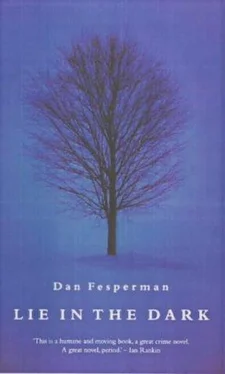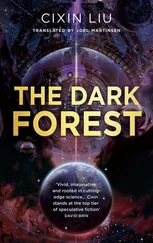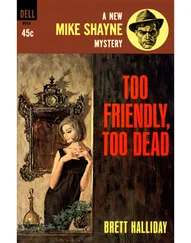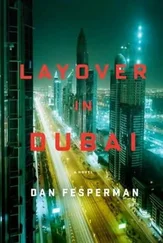Dan Fesperman - Lie in the Dark
Здесь есть возможность читать онлайн «Dan Fesperman - Lie in the Dark» весь текст электронной книги совершенно бесплатно (целиком полную версию без сокращений). В некоторых случаях можно слушать аудио, скачать через торрент в формате fb2 и присутствует краткое содержание. Жанр: Триллер, на английском языке. Описание произведения, (предисловие) а так же отзывы посетителей доступны на портале библиотеки ЛибКат.
- Название:Lie in the Dark
- Автор:
- Жанр:
- Год:неизвестен
- ISBN:нет данных
- Рейтинг книги:3 / 5. Голосов: 1
-
Избранное:Добавить в избранное
- Отзывы:
-
Ваша оценка:
- 60
- 1
- 2
- 3
- 4
- 5
Lie in the Dark: краткое содержание, описание и аннотация
Предлагаем к чтению аннотацию, описание, краткое содержание или предисловие (зависит от того, что написал сам автор книги «Lie in the Dark»). Если вы не нашли необходимую информацию о книге — напишите в комментариях, мы постараемся отыскать её.
Lie in the Dark — читать онлайн бесплатно полную книгу (весь текст) целиком
Ниже представлен текст книги, разбитый по страницам. Система сохранения места последней прочитанной страницы, позволяет с удобством читать онлайн бесплатно книгу «Lie in the Dark», без необходимости каждый раз заново искать на чём Вы остановились. Поставьте закладку, и сможете в любой момент перейти на страницу, на которой закончили чтение.
Интервал:
Закладка:
“Well, sweet one, we’re sorry, but there was nothing out of the ordinary to report from here.”
“And you’re the spokesman for this business association?”
“For the U.N., in fact.”
She extended her hand, as if for a very British handshake. “Chief of public affairs, U.N. bureau of personal services,” she said, cackling with a husky wheeze.
Vlado turned toward the others. “So nothing comes to mind then from last night. Nothing out of the ordinary or even noticeable,” he asked, but the first one was still the only one talking.
“If we told you what came to mind from last night you’d get so excited we’d have to charge you,” she said, while the others shrugged mutely. “Otherwise, it was nothing but the usual run of lonely faces and insulting offers. Am I right, ladies?”
A series of small nods. Vlado’s woman in red stared at the ground. He wanted to take her by the shoulders, force her to look him in the eye, though he couldn’t say for sure if it was only because he wanted some answers to his questions. Whatever, it was an obvious dead end as long as the taller woman was in charge. He should have let Damir handle this, as his first instincts had told him. Damir would have had this experienced old crone chatting and sharing cigarettes with him by now, spilling half her life’s story along the way.
“Well. If anything does occur to you later, I’m right down the block, fourth floor. Inspector Petric.”
“Don’t worry, we know the place,” the first woman’s voice called after him as he strolled around the curve of sandbags. “Some of our best customers work there. Good tippers, too, I hear.”
Her cackle rose high into the darkness, and Vlado flushed in spite of himself.
By the time Vlado reached his apartment a misty cold rain was falling. He was fatigued and hungry. It was his longest workday in months.
Yet he was energized in a way he hadn’t been since the beginning of the war. Certainly the case had problems, severe ones. But for all its portents of fear and difficulty, he’d no sooner go back to cases of murdered gypsies and drunks than he would go back to that slaughterhouse, with its stench of blood and panic.
He’d begun the investigation with doubts of his own abilities, and some persisted. Was he in over his head? Perhaps. But who wouldn’t be on this landscape, where rules and allegiances could change by the hour.
Far more worrisome than his lack of expertise was the thrust of the early evidence, such as it was. It seemed too pat, too tailored to his own needs, and those of the Interior Ministry. It might well be a concoction, either for the gain of the informers or for their bosses, who may have been eager to hide something far more complex and lucrative. Even if they were telling the truth, what would it matter. Their stories provided few useful details.
If Vlado was merely interested in disposing of the case in a tidy fashion, as Garovic would doubtless prefer, he felt sure that he need only hand over his and Damir’s four “sources” to Kasic for further questioning. Then, given enough time for more persuasive interrogation or more creative imaginations to bear fruit, Kasic’s people would emerge with enough to craft a conclusion.
Someone would be selected from the rough list of mobsters to take the blame. Perhaps the mobsters would even nominate one of their own, seizing a chance to further winnow the competition. The fellows at the slaughterhouse certainly wouldn’t be above such a trick.
Then the case would be turned back over to Vlado for its official closing, a fiction that he would sign and offer in triplicate to the appropriate international observers. It would be wrapped in the same soiled bundle with Vitas’s bloodied reputation, waved a few times before an uninterested world, then dropped out of sight and forgotten.
Vlado made up his mind that he would not proceed that way, not without being ordered to do so, even if it meant plodding through weeks of dead ends. Besides the possible danger of this approach, the only problem was that he had precious few leads.
But he did have one. Dead end or not, it might take the better part of a day to check out, if only because of its location.
He pulled from his satchel the crumpled name and address that had been in Vitas’s pocket the night of the murder. Then he lit a lazy two-inch flame from the nozzle of the hose leading across his kitchen wall. He strolled to a bookshelf and drew down a battered map of the city, unfolding it on the kitchen table in the flickering light.
“Milan Glavas” was the name on the strip of paper, and the address was indeed in Dobrinja, meaning Vlado would need a car. He traced his finger along the route, crossing the map’s creases and small tears. As always with maps, this one took him into the past, into parks and playgrounds with his daughter, into meandering walks of his youth on narrow wooded paths leading up into the hills. He ran his finger down familiar lanes and alleys, crossing snowbanks and green meadows from older, better days, passing the smells of a favorite bakery, the welcoming call of an old friend, now dead.
The world had been so large then, even if the city had been smaller. You could stroll up a mountain to catch a breeze from the northeast knowing that its smell and the way it felt in your lungs would tell you a little bit about every boundary and shoreline it had crossed to reach you-down from the Alps and across Italy, then over the Adriatic and into the dry hills of Dalmatia before finally climbing the green passes and mountains of Bosnia, to this city in the valley.
Nowadays the air only seemed stale and confined, which Vlado knew made no sense. And for the first time in nearly two years he felt the urge to climb upon the roof of his apartment building, to breathe deeply of the mountain air and again heed the call of distant lands. He would inspect his city as it reposed before him in the night, its scars hidden by the darkness. The Serbs should not be the only ones to enjoy the view.
He climbed the ladder slowly, listening for the whistle of a shell that could drive him back down, but the night was quiet. Stepping onto the roof into a scatter of broken glass, he found to his pleasure that the mist had cleared, and somewhere from behind the clouds the moon cast a pale light through the canopy. A staccato message of gunfire called to him from the west, but it was distant, harmless.
He strained his eyes toward the hills to the south, across the far bank of the river, wondering if anyone might be stirring along the battlefronts. Then he turned west, gazing toward the black hump of Zuc, gathered like a sleeping bear. To the north he scanned more ridges, then to the east. And at every vantage point, he knew, were men and weapons that could kill him in an instant if they knew he were out here, looking their way. He wondered what those men must see by day when they looked in this direction, the omnipotence they must feel as they aimed their barrels at buildings and people, seeing unmistakably who stood to die, or what buildings stood to fall, then watching the explosions as their shots soared to their destination.
The image brought to mind some verses from his youth, a poem from one of his advanced English classes. Who had written it? Stevenson, he remembered. Yes, Robert Louis Stevenson, the name that had sounded so funny and foreign to his ears at the time. The poem was “The Land of Counterpane,” and in having to memorize it some of the verses had stuck with him, had become his favorites because of the way they reminded him of his own boyhood-a child at home in bed with his toys arrayed about him like a tiny empire, of which he was lord and master.
He remembered a line from the middle, something about sending his “ships in fleets all up and down among the sheets.”
Читать дальшеИнтервал:
Закладка:
Похожие книги на «Lie in the Dark»
Представляем Вашему вниманию похожие книги на «Lie in the Dark» списком для выбора. Мы отобрали схожую по названию и смыслу литературу в надежде предоставить читателям больше вариантов отыскать новые, интересные, ещё непрочитанные произведения.
Обсуждение, отзывы о книге «Lie in the Dark» и просто собственные мнения читателей. Оставьте ваши комментарии, напишите, что Вы думаете о произведении, его смысле или главных героях. Укажите что конкретно понравилось, а что нет, и почему Вы так считаете.












